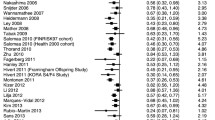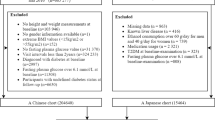Abstract
Adiponectin is found to associate with diabetes in studies apart from cohort studies. This prospective cohort study is to evaluate the predictive role of adiponectin in diabetes among participants with impaired fasting glucose (IFG). A total of 42,845 participants who visited 7 health examination centers located in Seoul and Kyunggi province, South Korea, during 2004–2008 were first included. Of the 42,845 participants, 5,085 participants had IFG. IFG was categorized as stage 1 (fasting glucose 100–109 mg/dL) or stage 2 (110–125 mg/dL). The incidence rates of diabetes were followed up to December, 2011. Hazard ratios (HRs) and 95 % confidence intervals (CI) were performed by Cox proportional hazard model. Of the 5,085 participants, 652 participants developed diabetes during a mean follow-up of 4.4 years. Low adiponectin was associated with diabetes among men with stage 2 IFG (HR, 1.78; 95 %CI, 1.33–2.38) while it was associated with diabetes among women with stage 1 IFG (HR, 2.64; 95 %CI, 1.38–5.03) and stage 2 IFG (HR, 2.17; 95 %CI, 1.07–4.42). When combined men and women, the association between adiponectin and diabetes was statistically significant in stage 2 IFG with an increase of about 82 % (HR, 1.82; 95 %CI, 1.40–2.39) after adjusting for age, sex, body mass index, waist circumference, and fasting serum glucose. There was an interaction by sex and stage 1 IFG in the association between adiponectin and risk of diabetes (P < 0.001). Adiponectin was independently associated with diabetes among participants with IFG. This association was apparent in stage 2 IFG. Adiponectin may be used as a predictor of diabetes in patients having IFG.


Similar content being viewed by others
Abbreviations
- IFG:
-
Impaired fasting glucose
- IGT:
-
Impaired glucose tolerance
- BMI:
-
Body Mass Index
- HRs:
-
Hazard ratios
- CI:
-
95 % Confidence intervals
References
M.G. Kovar, M.I. Harris, W.C. Hadden, The scope of diabetes in the United States population. Am J Pub Health 77, 1549–1550 (1987)
S.H. Jee, H. Ohrr, J.W. Sull, J.E. Yun, J. Min, J.M. Samet, Fasting serum glucose level and cancer risk in Korean men and women. JAMA 293, 194–202 (2005)
Bergman M. Pathophysiology of prediabetes and treatment implications for the prevention of type 2 diabetes mellitus. Endocrine. (2012). doi: 10.1007/s12020-012-9830-9 [Epub ahead of print]
K.H. Chun, Evidence-based management and treatment of high-risk individuals with pre-diabetes. J Korean Med Assoc 54, 1020–1027 (2011)
K.T. Chen, C.J. Chen, E.W. Gregg, G. Imperatore, K.M. Narayan, Impaired fasting glucose and risk of diabetes in Taiwan: follow-up over 3 years. Diabetes Res. Clin. Pract. 60, 177–182 (2003)
S.L. Edelstein, W.C. Knowler, R.P. Bain, A. Reubin, E.L. Barrett-Connor, G.K. Dowse et al., Predictors of progression from impaired glucose tolerance to NIDDM: An analysis of six prospective studies. Diabetes 46, 701–710 (1997)
M.I. Harris, Impaired glucose tolerance in the U.S. population. Diabetes Care 12, 464–474 (1990)
S.S. Rasmussen, C. Glümer, A. Sandbaek, T. Lauritzen, K. Borch-Johnsen et al., Determinants of progression from impaired fasting glucose and impaired glucose tolerance to diabetes in a high-risk screened population: 3 year follow-up in the ADDITION study, Denmark. Diabetologia 51, 249–257 (2008)
S. Li, H.J. Shin, E.L. Ding, R.M. van Dam, Adiponectin levels and risk of type 2 diabetes: a systematic review and meta-analysis. JAMA 302, 179–188 (2009)
C. Heidemann, Q. Sun, R.M. van Dam, J.B. Meigs, C. Zhang, S.S. Tworoger et al., Total and high-molecular-weight adiponectin and resistin in relation to the risk for type 2 diabetes in women. Ann. Intern. Med. 149, 307–316 (2008)
N. Zhu, J.S. Pankow, C.M. Ballantyne, D. Couper, R.C. Hoogeveen, M. Pereira et al., High-molecular-weight adiponectin and the risk of type 2 diabetes in the ARIC study. J. Clin. Endocrinol. Metab. 95, 5097–5104 (2010)
J.R. Kizer, A.M. Arnold, D. Benkeser, J.H. Ix, L. Djousse, S.J. Zieman et al., Total and high-molecular-weight adiponectin and risk of incident diabetes in older people. Diabetes Care 35, 415–423 (2012)
Y. Li, H. Yatsuya, H. Iso, H. Toyoshima, K. Tamakoshi, Inverse relationship of serum adiponectin concentration with type 2 diabetes mellitus incidence in middle-aged Japanese workers: six-year follow-up. Diabetes Metab Res Rev 28, 349–356 (2012)
A.G. Tabák, M. Carstensen, D.R. Witte, E.J. Brunner, M.J. Shipley, M. Jokela et al., Adiponectin trajectories before type 2 diabetes diagnosis: Whitehall II study. Diabetes Care 35, 2540–2547 (2012)
S.Y. Kim, S.J. Lee, H.K. Park, J.E. Yun, M. Lee, J. Sung et al., Adiponectin is associated with impaired fasting glucose in the non-diabetic population. Epidemiol Health 33, e2011007 (2011)
S.H. Jee, S. Lee, S. Min, J. Park, H.S. Kim, S.Y. Kim et al., Development of ELISA-kit of quantitative analysis for adiponetin and their correlation with cardiovascular risk factors. Korean J Epidemiol 29, 165–175 (2007)
S.H. Jee, A.W. Foong, N.W. Hur, J.M. Samet, Smoking and risk for diabetes incidence and mortality in Korean men and women. Diabetes Care 33, 2567–2572 (2010)
H.K. Kim, C.H. Kim, E.H. Kim, S.J. Bae, J. Choe, J.Y. Park, et al. Impaired fasting glucose and risk of cardiovascular disease in Korean men and women: The Korean Heart Study. Diabetes Care. (2012). doi: 10.2337/dc12-0587 [Epub ahead of print]
O.F. Khabour, S.H. Wehaibi, S.I. Al-Azzam, K.H. Alzoubi, Z.J. El-Akawi. Association of adiponectin with hypertension in type 2 diabetic patients: the gender effect. Clin Exp Hypertens. (2012). doi: 10.3109/10641963.2012.732645 [Epub ahead of print]
M. Azrad, B.A. Gower, G.R. Hunter, T.R. Nagy. Racial differences in adiponectin and leptin in healthy premenopausal women. Endocrine. (2012). doi: 10.1007/s12020-012-9797-6 [Epub ahead of print]
K. Rabe, M. Lehrke, K.G. Parhofer, U.C. Broedl, Adipokines and insulin resistance. Mol. Med. 14, 741–751 (2008)
T. Kadowaki, T. Yamauchi, N. Kubota, K. Hara, K. Ueki, K. Tobe, Adiponectin and adiponectin receptors in insulin resistance, diabetes, and the metabolic syndrome. J Clin Invest 116, 1784–1792 (2006)
C. Weyer, T. Funahashi, S. Tanaka, K. Hotta, Y. Matsuzawa, R.E. Pratley et al., Hypoadiponectinemia in obesity and type 2 diabetes:close association with insulin resistance and hyperinsulinemia. J. Clin. Endocrinol. Metab. 86, 1930–1935 (2001)
O. Tschritter, A. Fritsche, C. Thamer, M. Haap, F. Shirkavand, S. Rahe et al., Plasma adiponectin concentrations predict insulin sensitivity of both glucose and lipid metabolism. Diabetes 52, 239–243 (2003)
C. Menzaghi, V. Trischitta, A. Doria, Genetic influences of adiponectin on insulin resistance, type 2 diabetes, and cardiovascular disease. Diabetes 56, 1198–1209 (2007)
W. Du, Q. Li, Y. Lu, X. Yu, X. Ye, Y. Gao et al., Genetic variants in ADIPOQ gene and the risk of type 2 diabetes: a case-control study of Chinese Han population. Endocrine 40, 413–422 (2011)
T. Pischon, G.S. Hotamisligli, E.B. Rimm, Adiponectin: stability in plasma over 36 hours and within-person variation over 1 year. Clin. Chem. 49, 650–652 (2003)
Acknowledgments
This study was funded by the Seoul R&BD program (10526), the National Research Foundation of Korea (NRF) grant funded by the Korea government (MEST) (2011-0029348), a grant from the National R&D Program for Cancer Control, Ministry for Health, Welfare and Family affairs, Republic of Korea (1220180).
Conflict of interest
The authors have no conflict of interest related to this study.
Author information
Authors and Affiliations
Corresponding author
Additional information
Author Contributions
H.S.K. and S.H.J. drew the conception, researched the data, and wrote the manuscript. S.H.J. and J.J. analyzed data and edited the manuscript. L.J.E., T.Y.L., and H.K.B discussed and reviewed/edited the manuscript. Dr. Sun Ha Jee (S.H.J.) is the guarantor of this work and, as such, had full access to all the data in the study and takes responsibility for the integrity of the data and the accuracy of the data analysis.
Rights and permissions
About this article
Cite this article
Kim, HS., Jo, J., Lim, J.E. et al. Adiponectin as predictor for diabetes among pre-diabetic groups. Endocrine 44, 411–418 (2013). https://doi.org/10.1007/s12020-013-9890-5
Received:
Accepted:
Published:
Issue Date:
DOI: https://doi.org/10.1007/s12020-013-9890-5




